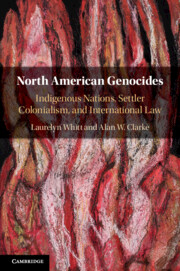Book contents
- North American Genocides
- North American Genocides
- Copyright page
- Dedication
- Epigraph
- Contents
- Preface
- Acknowledgments
- Introduction
- Chapter 1 North American Genocide Denial
- Chapter 2 The Legal Case for North American Genocides: a Retrospective Methodology
- Chapter 3 Settler Colonialism and Indigenous Nations
- Chapter 4 A Legal Primer for Settler Colonial Genocides
- Chapter 5 The Beothuk Nation (1500–1830)
- Chapter 6 The Powhatan Tsenacommacah (1607–1677)
- Chapter 7 The Conventional Account of Genocide: from a Restrictive to an Expansive Interpretation
- Chapter 8 Toward an Account of Systemic Genocide
- Appendix Convention on the Prevention and Punishment of the Crime of Genocide
- Index
Introduction
Published online by Cambridge University Press: 12 July 2019
- North American Genocides
- North American Genocides
- Copyright page
- Dedication
- Epigraph
- Contents
- Preface
- Acknowledgments
- Introduction
- Chapter 1 North American Genocide Denial
- Chapter 2 The Legal Case for North American Genocides: a Retrospective Methodology
- Chapter 3 Settler Colonialism and Indigenous Nations
- Chapter 4 A Legal Primer for Settler Colonial Genocides
- Chapter 5 The Beothuk Nation (1500–1830)
- Chapter 6 The Powhatan Tsenacommacah (1607–1677)
- Chapter 7 The Conventional Account of Genocide: from a Restrictive to an Expansive Interpretation
- Chapter 8 Toward an Account of Systemic Genocide
- Appendix Convention on the Prevention and Punishment of the Crime of Genocide
- Index
Summary
This book takes seriously the issue of North American Indigenous genocides. Focusing on the earliest stages of British colonization, we draw on the established legal definition of genocide – presented initially in the United Nations Genocide Convention – to determine whether the term genocide might appropriately be ascribed to historical events which marked the onset of settler colonialism. Our reflections will be confined to two cases that unfolded on Indigenous lands within what would later be known as Canada and the United States. The first relates the experiences of the Beothuk Nation from 1500–1830 on the island that became Newfoundland; the second follows the Powhatan Tsenacommacah from 1607 to 1677 in their struggle with British colonists over the tidewater and piedmont regions of what was called the Virginia Colony. We then assess and critique that account of genocide, suggesting how it might evolve beyond its current limitations, and determining what its general implications might be for the forcible transfer of Indigenous children to residential and boarding schools in Canada and the United States. We conclude by briefly considering the merits of some recent socio-historical contributions to genocide studies that promise to enhance our understanding of genocide in significant ways.
- Type
- Chapter
- Information
- North American GenocidesIndigenous Nations, Settler Colonialism, and International Law, pp. 1 - 7Publisher: Cambridge University PressPrint publication year: 2019

